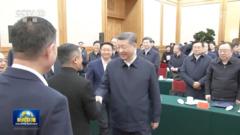Ma's attendance, hailed as a sign of potential rehabilitation, raises questions about Beijing's evolving stance towards private enterprises amidst a recovering economy.
Jack Ma's Return: A New Era for China's Tech Sector?

Jack Ma's Return: A New Era for China's Tech Sector?
Jack Ma's public reappearance alongside Xi Jinping has stirred speculation about the future of China's technology industry and economic policy.
This week, Jack Ma, the influential founder of Alibaba, was spotted at a significant meeting with Chinese President Xi Jinping and prominent business leaders. His presence, after a lengthy absence since 2020 following criticisms of China’s financial system, has ignited optimism and conjecture about the implications for the tech sector and the broader economy.
Upon his return, Chinese tech stocks responded positively, with Alibaba announcing robust financial results and a share price increase of over 60% for the year. Analysts interpreted Ma's front-row seating at the symposium and his interaction with Xi as an indication of potential government leniency towards the tech industry, which suffered under strict regulations after Ma's controversial comments about the financial sector.
While Ma did not take the stage, his presence has led many to speculate that this could be a turning point for the relationship between private enterprises and the Chinese government. Social media outpourings in support of Ma’s return reflect a public sentiment that sees his comeback as beneficial for the country's economic revitalization.
Historically, Ma's decline was tied to a crackdown on China's tech industry that followed his critique of state-owned banks and the subsequent cancellation of Ant Group's planned IPO. Some analysts see Ma's renewed visibility as a signal that the Chinese leadership may be shifting towards a more supportive environment for private enterprise, particularly for sectors pivotal in fostering innovation and overcoming economic challenges.
During the symposium, Xi called for technological innovation and encouraged private entrepreneurs to contribute more actively to the nation's growth, suggesting a favorable climate for the tech industry. However, caution remains; experts believe that while the era of aggressive regulatory crackdowns might be easing, the government still expects alignment with national objectives.
The backdrop for Ma's return and the meeting includes a recent surge of national pride over developments in artificial intelligence, which prompted renewed investment interest in Chinese stocks. As China navigates heightened restrictions on technology imports from the U.S., there is a push towards self-reliance in critical areas such as semiconductors and AI.
Analysts speculate that Xi's engagement with tech leaders is part of a larger strategy to realign the private sector with state goals of high-quality development aimed at modernizing the economy by 2035. While this suggests a more controlled engagement approach, the crucial test will be whether Chinese entrepreneurs can operate freely while still adhering to government priorities.
As Jack Ma steps back into the spotlight, the global implications of his return could influence China's economic trajectory, illustrating the complex balance between private enterprise ambitions and state control in the world's second-largest economy.






















